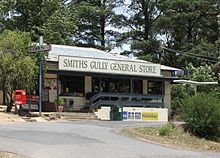
A convenience store, convenience shop, bodega, corner store, corner shop, or superette is a small retail store that stocks a range of everyday items such as tea, coffee, groceries, fruits, vegetables, snacks, confectionery, soft drinks, ice creams, tobacco products, lottery tickets, over-the-counter drugs, toiletries, newspapers and magazines.
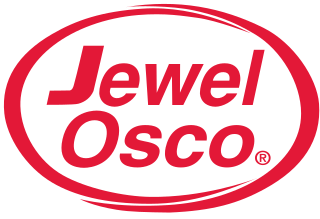
Jewel-Osco is a regional supermarket chain in the Chicago metropolitan area, headquartered in Itasca, a western suburb. In 2007, the company had 188 stores across northern, central, and western Illinois; eastern Iowa; and portions of northwest Indiana. Jewel-Osco has been a wholly owned subsidiary of Boise-based Albertsons since 1999. The company originally started as a door-to-door coffee delivery service before it expanded into delivering non-perishable groceries and later into grocery stores, and supermarkets. Prior to its 1984 acquisition by American Stores, Jewel evolved into a large multi-state holding company that operated several supermarket chains and other non-food retail chain stores located from coast to coast and had operated under several different brand names.
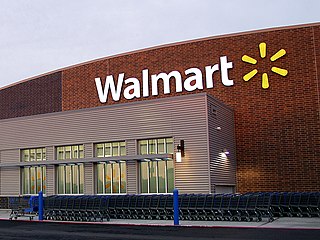
A supermarket is a self-service shop offering a wide variety of food, beverages and household products, organized into sections. This kind of store is larger and has a wider selection than earlier grocery stores, but is smaller and more limited in the range of merchandise than a hypermarket or big-box market. In everyday United States usage, however, "grocery store" is often used to mean "supermarket".

Shoplifting, shop theft, retail theft, or retail fraud is the theft of goods from a retail establishment during business hours, typically by concealing a store item on one's person, in pockets, under clothes or in a bag, and leaving the store without paying. With clothing, shoplifters may put on items from the store and leave the store wearing the clothes. The terms shoplifting and shoplifter are not usually defined in law. The crime of shoplifting generally falls under the legal classification of larceny. Shoplifting is distinct from burglary, robbery, or armed robbery. In the retail industry, the word shrinkage can be used to refer to merchandise lost by shoplifting, but the word also includes loss by other means, such as waste, uninsured damage to products and theft by store employees.

A grocery store (AE), grocery shop (BE) or simply grocery is a retail store that primarily retails a general range of food products, which may be fresh or packaged. In everyday U.S. usage, however, "grocery store" is a synonym for supermarket, and is not used to refer to other types of stores that sell groceries. In the UK, shops that sell food are distinguished as grocers or grocery shops

A variety store is a retail store that sells general merchandise, such as apparel, auto parts, dry goods, toys, hardware, furniture, and a selection of groceries. It usually sells them at discounted prices, sometimes at one or several fixed price points, such as one dollar, or historically, five and ten cents. Variety stores, as a category, are different from general merchandise superstores, hypermarkets, warehouse clubs, grocery stores, or department stores.

Loblaw Companies Limited is a Canadian retailer encompassing corporate and franchise supermarkets operating under 22 regional and market-segment banners, as well as pharmacies, banking and apparel. Loblaw operates a private label program that includes grocery and household items, clothing, baby products, pharmaceuticals, cellular phones, general merchandise and financial services. Loblaw is the largest Canadian food retailer, and its brands include President's Choice, No Name and Joe Fresh. It is controlled by George Weston Limited, a holding company controlled by the Weston family; Galen G. Weston is the chair of the Loblaw board of directors, as well as chair of the board of directors and CEO of Canada-based holding company George Weston.

A strip mall, strip center, strip plaza or simply plaza is a type of shopping center common in North America and Australia where the stores are arranged in a row, with a footpath in front. Strip malls are typically developed as a unit and have large parking lots in front. Many of them face major traffic arterials and tend to be self-contained with few pedestrian connections to surrounding neighborhoods. Smaller strip malls may be called mini-malls, while larger ones may be called power centers or big box centers. In 2013, The New York Times reported that the United States had 65,840 strip malls. In 2020, The Wall Street Journal wrote that in the United States, despite the continuing retail apocalypse starting around 2010, investments and visitor numbers were increasing to strip malls.
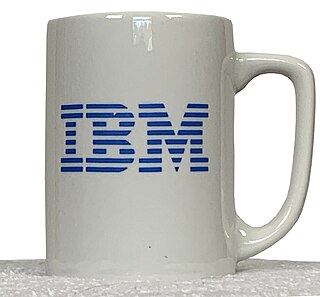
Merchandising is any practice which contributes to the sale of products to a retail consumer. At a retail in-store level, merchandising refers to displaying products that are for sale in a creative way that entices customers to purchase more items or products.

A general merchant store is a rural or small-town store that carries a general line of merchandise. It carries a broad selection of merchandise, sometimes in a small space, where people from the town and surrounding rural areas come to purchase all their general goods. The store carries routine stock and obtains special orders from warehouses. It differs from a convenience store or corner shop in that it will be the main shop for the community rather than a convenient supplement.

Fast-moving consumer goods (FMCG), also known as consumer packaged goods (CPG) or convenience goods, are products that are sold quickly and at a relatively low cost. Examples include non-durable household goods such as packaged foods, beverages, toiletries, candies, cosmetics, over-the-counter drugs, dry goods, and other consumables.
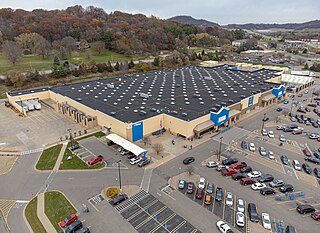
A big-box store, a hyperstore, a supercenter, a superstore, or a megastore is a physically large retail establishment, usually part of a chain of stores. The term sometimes also refers, by extension, to the company that operates the store. The term "big-box" references the typical appearance of buildings occupied by such stores.

Woolworths Supermarkets is an Australian chain of supermarkets and grocery stores owned by Woolworths Group. Founded in 1924, Woolworths is currently Australia's largest supermarket chain with a market share of 33% as of 2019.
The Industry Classification Benchmark (ICB) is an industry classification taxonomy launched by Dow Jones and FTSE in 2005 and now used by FTSE International and STOXX. It is used to segregate markets into sectors within the macroeconomy. The ICB uses a system of 11 industries, partitioned into 20 supersectors, which are further divided into 45 sectors, which then contain 173 subsectors.

Chedraui is a publicly traded Mexican grocery store and department store chain which also operates stores in the U.S. in the states of California, Arizona, New Mexico, Texas, and Nevada under the banner name El Super and stores in Texas under the banner name Fiesta Mart. It is traded on the Mexican Stock Exchange under the symbol CHEDRAUI.

Dry goods is a historic term describing the type of product line a store carries, which differs by region. The term comes from the textile trade, and the shops appear to have spread with the mercantile trade across the British Empire as a means of bringing supplies and manufactured goods to far-flung settlements and homesteads. Starting in the mid-18th century, these stores began by selling supplies and textile goods to remote communities, and many customized the products they carried to the area's needs. This continued to be the trend well into the early 20th century. With the rise of department stores and catalog sales, the decline of dry goods stores began, and the term has largely fallen out of use. Some dry goods stores became department stores especially around the turn of the 20th century.
NightOwl Convenience Stores is a franchised system of convenience stores operating in Australia - predominantly in the state of Queensland.
The retail format influences the consumer's store choice and addresses the consumer's expectations. At its most basic level, a retail format is a simple marketplace, that is; a location where goods and services are exchanged. In some parts of the world, the retail sector is still dominated by small family-run stores, but large retail chains are increasingly dominating the sector, because they can exert considerable buying power and pass on the savings in the form of lower prices. Many of these large retail chains also produce their own private labels which compete alongside manufacturer brands. Considerable consolidation of retail stores has changed the retail landscape, transferring power away from wholesalers and into the hands of the large retail chains.
